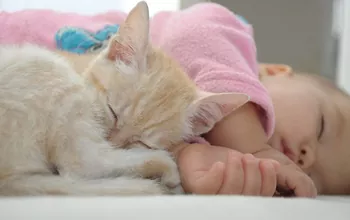
Here are some tips for preparing your cat for a new baby
Congratulations on the addition of your new human! Use these tips to introduce your cat to a new baby on the right paw.
A new baby is a big change for everyone. Your cat may have a difficult time adjusting to such a big change in your household since he is a creature of habit.
What can you do to prevent your cat from becoming upset by the unfamiliar sounds and smells associated with an infant? Here are a few tips you can use to prepare your cat for a new baby.
Here’s how to introduce your dog to a new baby: How To Introduce Your Dog To A New Baby
Change Your Cat’s Schedule Gradually
When your baby comes home, your schedule will change dramatically and become pretty chaotic. As a result of the sudden changes, your cat may become stressed. In order to prepare for the arrival of the baby, it is a good idea to gradually change his schedule and habits.
Consider the times of day when you’ll be able to clean the litter box, play with your cat, and feed him. Slowly begin to follow this new schedule by gradually shifting the times at which you and your cat enjoy these activities.
First-time parents jitter about fur and human babies
Preparing this schedule before the baby arrives will also ensure that you don’t neglect your cat. Throughout the day, he’ll already be used to getting more attention from you at certain times and less attention at other times.
Make a decision about whether your cat will be allowed in the baby’s room
Your cat should not be allowed in the baby’s room.
Your cat won’t be allowed in the baby’s room if:
You should move any furniture that your cat enjoys sitting on to another area of the house so that he will still be able to use it.
Before the baby arrives, start restricting your cat’s access to the room. Train him that the area is off-limits by using a tall baby gate or simply keeping the door closed.
When you’re in the baby’s room, place a cat tree or cat bed outside so that he can still be near you.
Keep some cat treats in the baby’s bedroom so you can leave them for your kitty every time you go into the room to spend time with your baby. The reward will ensure that he doesn’t feel neglected or abandoned by staying outside.
Never punish your cat for entering the baby’s room. Pick him up gently and take him outside. Neither of you want to instill fear or aggression in your baby, nor do you want him to associate your baby with negative experiences or emotions.
Your kitty will be allowed in the baby’s room if:
ASPCA recommends filling empty soda cans with coins to discourage your cat from jumping into your baby’s crib. Your cat will knock into these when he tries to jump into your crib if you place them on the rim. By making a noise, the cans will discourage him from trying to jump in again and train him to stay out of the crib.
You can give your cat a cat tree or bed to relax in while inside the room. Using treats on the tree or in the bed as a reward, you can train him to stay in his place.
Get Your Cat Used to Baby Smells and Sounds
Play baby sounds, like crying and cooing, on your computer or off a CD before your baby comes home. To reinforce the positive association with the sounds, offer him treats while he listens. Over a few weeks, gradually increase the volume of these sounds while making sure your cat is comfortable.
When you play with your cat, you can use products like diaper cream or lotion on your skin to expose him to baby smells.
Cats and Babies: How to Make Them Comfortable
When your kitty is safely near the baby after you’ve brought your baby home, give him treats and praise. Let him come near you and the baby naturally rather than forcing him.





